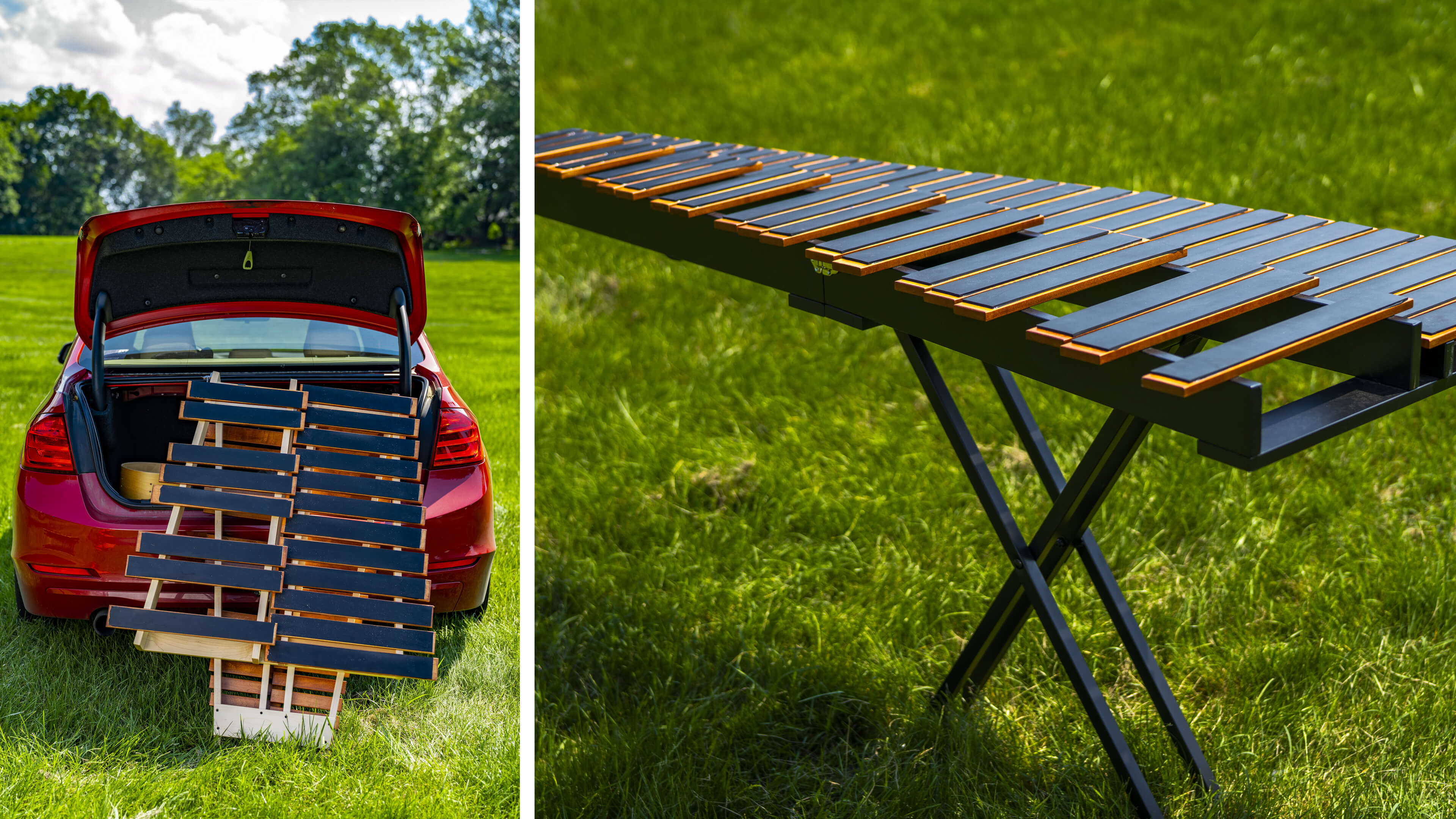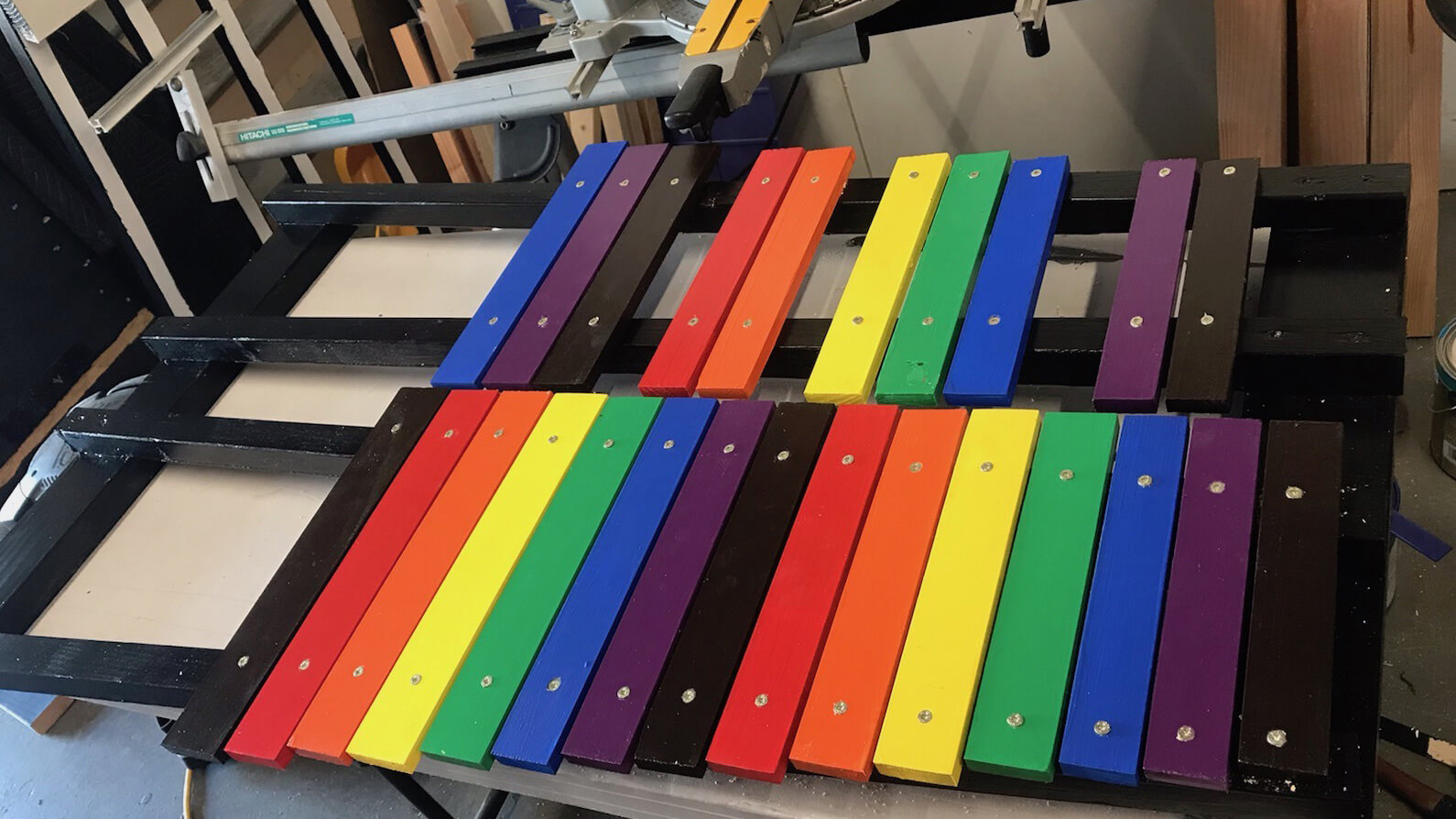The lightbulb, the telephone, even the Monopoly game board and the Slinky — all patented inventions that have changed the course of history.
As of November 8, 2022, the Jersey Surf has added its mark to the annals of commerce, joining the lexicon of patented inventors as the proud owners of U.S. Patent No: 11,495,197 B2. Filed under the category of “Musical Instruments Configured to Help Refine Playing Technique, and Method of Making Same,” as an item otherwise known as the MarimbaPad.
The new product from the New Jersey drum corps, specifically from the minds of Richard Klimowicz and Robert Jacobs, is a first-of-its-kind practice tool for mallet percussionists, whether participating in the marching arts or making music on a concert stage. It is believed that this is the first time a Drum Corps International drum corps has patented its own educational invention.
Over the years, plenty of drum pads have made their way to market – items that can be stashed away in a backpack and easily carried home whenever students don’t have access to their actual drums to practice. But an inherent challenge has always existed for front ensemble percussionists in drum corps and marching band as well as aspiring jazz and orchestral performers. How do you effectively practice at home short of having your own marimba with a price tag of several thousand dollars, or renting a U-Haul to transport the 315-pound concert instrument back and forth from school to bedroom?
The MarimbaPad helps solve that problem.
“We took the concept of a drum pad and set out to replicate that to develop the MarimbaPad,” said Klimowicz. “The MarimbaPad is designed to be a practice pad for mallet players, to help them as a tool to have access to a regular practice solution for those who may not own their full-scale instrument, or have access to a practice room or school facility that can provide that for them.”
The hand-crafted practice pad itself is made from maple, with neoprene pads covering the instrument’s bars. It’s replicated to the exact size and scale of a 4.3 octave marimba — which is the most popular size in widespread use. The MarimbaPad is foldable, allowing it to pack up small enough to fit into a standard-size car trunk, in a closet or under a bed.

“When a mallet player is behind it, it feels like they're behind their marching marimba or their concert marimba,” Klimowicz said. “When I say that we replicate it like a practice pad, it does have neoprene pads on top to cut down the volume, but it doesn't compromise the touch or the feel.”
Klimowicz, who outside of serving as operations director of the Jersey Surf, is a Lancaster, Pennsylvania-based professional percussionist and educator. He said that the idea for the invention developed out of his own experience as a young mallet percussionist turned teacher, trying to help himself and his students to practice more efficiently and effectively.
“The common question that I would get (from my students) was, ‘How can I practice this at home? How can I improve on what my instructors and my teachers are guiding me to do?,’” he said. “And there hasn't been an easy solution.”
The road from idea to sellable product has been a process spanning more than three years. With the benefit of resources from the Jersey Surf including a keen interest in developing the project from Surf executive director Bob Jacobs, the formal invention and patent process was accelerated during the corps’ downtime caused by the COVID-19 pandemic when the ability for students to rehearse on actual concert instruments was nearly non-existent.
“We started with one really creative idea,” Klimowicz said, “As we sorted out measurements, pitches of angles, depths of wood, quality of wood, and colors, we built about 10 or 12 prototypes.”

From there they made decisions on how the product could be easily replicated and manufactured, and kept tweaking and testing things along the way.
“When we added the neoprene to the pad’s bars, then we had to test it with different types of mallets,” Klimowicz said. “All this to come to a point where we don't really have any limitations. If you have a favorite set of mallets, or something that feels good to you as an individual, any of those can be used on this product without compromise.”
As far as the patent process is concerned, Klimowicz says that much of the reason that they went this route was to make sure that they weren’t investing time and materials to create something that was already in existence.
“It was important to us because it was a part of our research,” he said. “We wanted to make sure that there was nobody out there who had already perhaps created something that we could work with or continue to evolve.”
The U.S. Patent process begins in the form of a detailed application. Klimowicz and Jacobs worked with an intellectual property attorney to thoroughly research existing patents to establish the originality of their invention. Over the course of time they compiled detailed measurements and specifications, transferring their own hand-drawn illustrations into the technical drawings to be filed with the application. From start to eventually being granted their patent was a process of just over two and a half years.
The MarimbaPad is now available on the market in the United States, currently selling online for $895. Although the patent and prototypes cover various sizes and configurations of mallet percussion instruments, Jacobs says that the current focus on the 4.3-octave marimba will be their priority for the foreseeable future.
“We’re currently producing the MarimbaPads through a relationship we’ve developed with an experienced and meticulous custom fine furniture maker,” says Jacobs. “We’re keeping up with initial demand by producing the instruments a few dozen at a time, although our long-term plan is to license the patent to a commercial manufacturing partner in order to gain scale as demand increases.”
Although the profit from the sale of the instruments will eventually provide a modest revenue stream to the Jersey Surf organization, Klimowicz noted that the greater educational goal of the MarimbaPad project is to get the realistic, full-scale instruments into the hands of as many schools, students and musicians as possible.
“It’s all about students and musicians being able to learn their music in virtually any location in a very convenient way,” Klimowicz said. “The fact that meaningful practice and warmup can be achieved quietly and conveniently in a dorm room, apartment, bedroom or even a greenroom backstage we think is a real game-changer.”
To increase and accelerate opportunities for success in establishing and growing MarimbaPad, Jersey Surf has engaged the assistance of two separate teams of students from California State University – Northridge (CSUN) and LaSalle University in Philadelphia. The two groups are focusing on a variety of things from accurately measuring potential market size to establishing and refining product attributes, to manufacturing and marketing strategies.
“A group from CSUN’s Graduate Consulting Project in Music Industry Administration along with a team from LaSalle’s Center for Entrepreneurship are simultaneously helping us to evaluate and maximize the real-world potential for this product from every angle,” Jacobs said. “We are extremely grateful for the enthusiastic assistance and unique perspectives of each team, and we look forward to incorporating their insights into our continued strategic planning, ongoing production and eventual expansion of the MarimbaPad brand.”


